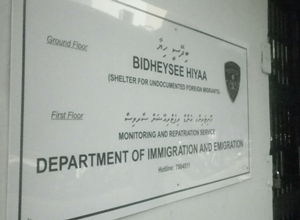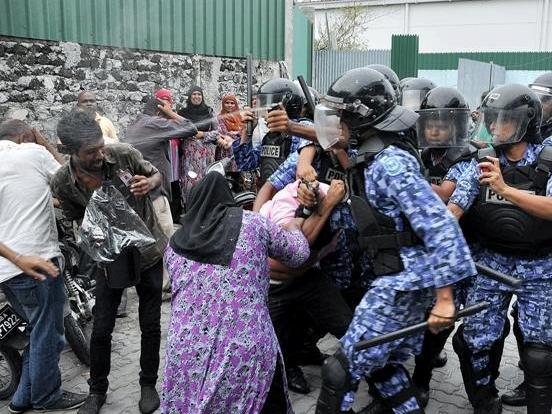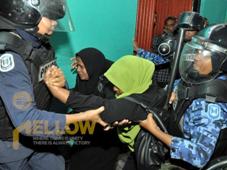The Human Rights Commission of the Maldives (HRCM) in a report investigating alleged human rights violations on February 6 and 7 has said former President Mohamed Nasheed’s life was not in danger at the time of his resignation.
“The investigation did not find that anyone had tried to assassinate President Mohamed Nasheed during the time he spent inside Bandaara Koshi – the Maldives National Defence Force (MNDF) headquarters – on February 7,” the HRCM concluded.
According to the report, the commission was requested to investigate claims that the former president’s life was in danger while he was inside military barracks. The request was made on April 11, 2012 by the chair of parliament’s Independent Institutions Committee, MP Mohamed ‘Kutti’ Nasheed,
The HRCM report was compiled based on the findings of its own investigations, which included witness statements from the police and the MNDF, media reports, video and photographic evidence as well as eyewitnesses accounts from representatives of all political parties.
However, the commission noted that despite repeated attempts, Nasheed refused to cooperate with the investigation, which forced them to compile the report without his statement or account of events leading up his resignation.
The report focused on six areas: the incidents that took place at Male’s Artificial Beach area on the night of February 6; vandalism of the former ruling Maldivian Democratic Party (MDP) Haruge camp or gathering spot by rogue police officers; the attack on private broadcaster Villa TV (VTV); incidents that took place at the Republican Square on February 7; the storming of the compound of state broadcaster Maldives National Broadcasting Corporation (MNBC) by police and army officers; and Nasheed’s claim that mutinying or rebellious officers tried to lynch him inside the MNDF headquarters.
Clashes at artificial beach
On the night of February 6, demonstrators from the ‘December 23 coalition’ of eight political parties of the then-opposition were facing off supporters of the MDP at the artificial beach, following three weeks of opposition protests that saw attacks on journalists of the state broadcaster MNBC and MDP-aligned Raajje TV as well as vandalism of a minister’s residence.
The HRCM report contended that the violence that took place on February 6 at the artificial beach area was triggered by an “unlawful” order directly from President Nasheed for riot police to withdraw from the protest zone.
The commission noted that article 6(d) of the Police Act clearly states that the police must maintain safety and public order while article 6(h) states that police should maintain order at venues set up for public use or gatherings.
The order for police to withdraw from the artificial beach area was therefore in violation of the law and constitutional provisions, the HRCM report stated.
“[…] despite repeated advice given by the police officers on ground that it was not a good move for the police to abandon the scene, the Home Minister and several senior officers from the police ordered the police to leave the area in violation of the aforementioned clauses, which resulted in police not being able to fully carry out their duty,” the HRCM report stated.
The police eventually left the area after MNDF officers arrived at the scene, but the commission’s report claimed that the incoming military officers also retreated soon thereafter, leaving the rival protesters to throw stones at each other for 15 minutes.
“Despite article 7(b) of Maldives National Defence Force Act setting provisions to defend and protect the Maldives’ independence and sovereignty, as well as protecting the national interests of the country, the MNDF officers at the order of the president, left the scene even when it was evident that the tensions between the two protesting group would give rise to violence,” the report stated.
HRCM noted that the MNDF failed to take adequate measures to prevent the violent confrontation.
“Due to this, the protesters were dispersed after several participants got severely injured from the violence that began. Therefore the MNDF had failed in carrying out their legal duty,” the findings stated.
The report also noted that senior police officials tried to obstruct officers who left the police headquarters at the Republic Square when they heard of the clash between the protesters.
It also claimed that the police did not take any action to confiscate items that the protesters wielded at the time, which could have been used as weapons despite officers having knowledge about it.
The commission, based on the findings, has urged the MNDF, Maldives Police Service and the Police Integrity Commission to investigate and take action against those officers who obeyed the “unlawful” order and also called on the political parties to be more responsible in carrying out their activities.
Vandalism of MDP Haruge
Based on the information collected from the members of MDP present at Haruge during the time of the alleged police vandalism, the report stated that about 30 police officers in Special Operations (SO) uniform entered into premises at a time between 12:00am to 12:30am in the early hours of February 7.
“Police entering into Haruge smashed plates, toppled a bondibai (traditional Maldivian rice pudding) buffet, overturned a pickup truck inside the premises, brought down the MDP podium and attacked one person, while another person was grappled and thrown against a wall, after which he had to seek medical assistance from ADK Hospital,” according to information provided by MDP.
The report also stated that former State Minister for Home Affairs, Mohamed ‘Monaza’ Naeem was attacked by the police, while one person present was pepper sprayed in the face as the police officers present hit another individual on the back with a chair.
The MDP, in the information given to the report, also claimed that the police had smashed the window of the Maldives Media Council office with a baton before they left the area.
Attack on Villa TV
The HRCM in its report, highlighted that private broadcaster Villa Television (VTV), owned by the now government-aligned Jumhoory Party (JP) leader Gasim Ibrahim, was attacked by two men who had attempted to set the station on fire.
“On the night of February 6, a group of people attacked Villa TV and set fire on some parts of the building and this instilled fear and chaos within the employees of the station, who had suffered psychologically,” the report stated.
The report noted that the station suffered damages to the building’s structure, as well as the broadcaster’s equipment.
The HRCM also highlighted that police, who were asked to ensure the security of the premises following previous requests, were not present when the attacks took place.
“Following the instability in Male’ and with numerous threats received to the station, the company running the station had requested assistance from the police for security and police kept guarding the premises. However, the police officers who were to be present at the station for security purpose were not there when the attacks took place on the night of February 6,” read the report.
The HRCM requested that the Maldives Police Service and the PIC investigate the matter and take action against those found responsible.
Incidents at Republican Square on February 7
HRCM observed that after vandalising MDP Haruge, the mutinying officers headed back to the Republican Square area of the capital.
“An order was issued to all the police officers who came from artificial beach to assemble in the Republican Square in the helipad area. Meanwhile officers who were not in uniform and those in working uniform were ordered to be present on the third floor of the police headquarters building by Deputy Commissioner of Police Ahmed Muneer,” it read.
The police who had assembled were told by the Deputy Commissioner of Police Ahmed Atheef that certain officers had disobeyed their orders and therefore should be responsible for any circumstances that were to arise from their action.
“There were claims that the police institution was falling apart because of the ongoing corruption within, including drug issues and other concerns, and that complaints over the issues were retained in the middle management which meant the police officers had to rely on the middle management. The police officers at the scene decided not follow any unlawful orders and to demand the commissioner of police to not to take any action against officers following their actions,” read the report.
The report claimed that the police officers, when they heard the news that the MNDF were coming to arrest them, came to alert their colleagues and claimed that they were prepared to confront the military officers.
Initially the commissioner of police refused to meet the mutinying officers, but later agreed to meet them at the police barracks in Iskandhar Koshi (IK).
“When the Commissioner of Police (CP)’s secretary came and requested that the officers go to IK to meet him, the police stood up to go, but when the MNDF were instructed to go to there without their shields, arms and riot gear, the police changed their mind and demanded the commissioner of police to meet them at the Republican Square,” the report claimed.
Police who had given information to the report claimed that the officers were exhausted and very hungry after the continuous duty from the night of February 6, adding they could only go to toilet with an authorized officer.
At about 06:08am, President Mohamed Nasheed arrived to Republican Square to talk to the mutinying officers.
The report claimed that Nasheed had told the officers that they had committed a “very despicable act” and to hand themselves over to MNDF, but the officers responded saying “no sir!”
Nasheed later left the area and went inside Bandaara Koshi (BK), the MNDF barracks.
At 8:00am, police in the report claimed while they were reciting the police oath, a group of protesters with metal rods and wooden sticks came barging into republican square chanting “arrest Baaghees (rebels)”.
They claimed that in the group of protesters, MDP MPs including MP Eva Abdulla, MP Ahmed Easa and MP Mohamed Shifaz were present.
“When the group entered into the Republican Square, police confronted the group with their battons and claimed that when the violence arose, confrontations were going on even between civilian groups,” read the report.
The HRCM said the constitution, in article 46, stated that a person could be arrested only if they are found committing a crime; there was valid reason to believe they may commit a crime, there were evidence that a suspect had committed a crime or a court order had been issued approving such an action.
“…but the MNDF under the direct order of the president tired to arrest police officers who assembled at the Republican Square under the order of senior officials of police,” the report highlighted, implying that Nasheed’s order was unlawful.
The report highlighted that the situation escalated because of Nasheed’s alleged unlawful orders and because of it, a lot of civilians and police officers suffered injuries of varying nature.
Raiding of MNBC
At about 6:00am, the HRCM said were rumours were circulating that anti-government protesters were planning on entering the offices of state broadcaster, the Maldives National Broadcasting Corporation (MNBC), to take over the station.
The report claimed that on the night of February 6, a group of civilians with batons and sticks who had previously been in the MDP Haruge area were inside the MNBC offices, claiming to be on guard for an impending raid from the mutinying police and anti-government protesters.
Police officers arrived to the station in the morning of February 7, but were attacked from the civilians present, who were claiming to be handling the security of the station.
“Confrontations took place between police, who came in a pickup truck to MNBC building, and the civilians. The civilians attacked the police with ground chili and other objects, including wooden sticks and stones, which forced the police to leave,” the report read.
According to the report, the police attempted to take over the station twice, succeeding the third time when they came along with several civilians who were presumed to be anti-government protesters.
It also claimed that the civilians who entered into the premises used foul language towards the employees of the station, with one civilian quoted by the report stating; “you’ve spread enough lies”.
The report claimed that the first person to enter the newsroom was a civilian with a metal rod, who entered the room and ordered all the staff to leave. However, the police later entered and told staff that they were present, but not to attack any employees.
People who entered into the MNBC offices then ordered staff to change the station’s feed to private broadcaster VTV’s feed.
“A person who claimed to be the representative of the vice president, along with a person representing the opposition came to the station and said that ‘from now onwards there will be no MNBC and the station would now be called TVM,’ and the name was changed following the demand,” read the report.
The HRCM, in the report, requested that police and the Police Integrity Commission look into the unlawful actions carried out by both the civilians and the police officers.
Alleged attempt to lynch Nasheed
Following remarks made on April 11 during a parliament committee meeting held with the members of HRCM, several MPs posed questions to the HRCM to determine whether they had knowledge that the opposition had plans on “lynching” Nasheed on the day his government was toppled.
Following the remarks, the HRCM in its report stated that it had questioned the police, the MNDF and Nasheed’s bodyguards.
The report also claimed that it had analysed statements that Nasheed gave to media after his resignation, however it said that no information from Nasheed was included in the report as he did not provide a statement.
Nasheed’s bodyguards in the report claimed that there was no threat posed to Nasheed’s life or any of his family members.
“When people call for the resignation of the president, it is not deemed to be a threat to his life, and it was not a situation where any extra measures have to be taken and if he had wanted to go out, it could have been arranged. If the president sees a threat posed to him, the people whom he should first inform are his bodyguards, but the president had never said anything about a threat,” read the report.
The report added that the president had asked the MNDF officer if his family were safe, to which the officers replied that the family was safe and bodyguards were with them for protection from any impending harm.
“When Nasheed went to the Presidents Office from the MNDF barracks [to resign], there were a large crowd of people gathered near the car chanting disapproval of him, and some of the people in the crowd threw cigarette butts towards his car but despite how bad the situation was, Nasheed would have been easily transferred safely to anywhere he wished to go, and the MNDF officers had made way within the crowd gathered for his car to safely pass,” it read.
The report also stated that some military officers who had rebelled had “smacked” his car while he was being taken to the President’s Office on several occasions, but it was still a safe situation.
It also said that the President’s Office, when Nasheed arrived, appeared to be calm, with no signs of unrest inside the building at all.
“The commission finds in the investigation that following the obeying of orders given by President Mohamed Nasheed against the constitution, the international conventions, the police and military act by senior officials of the MNDF and Police, the chain of command among the police and military was broken, several MNDF and police officers and civilians got injured and large amount of public property was damaged. Several rights were also compromised.
“The investigation also finds that there was no threat posed to President Mohamed Nasheed while he was in the MNDF Barracks on the day of February 7,” the HRCM report concluded.
Likes (0)Dislikes
(0)Dislikes (0)
(0)
 (0)Dislikes
(0)Dislikes (0)
(0)


